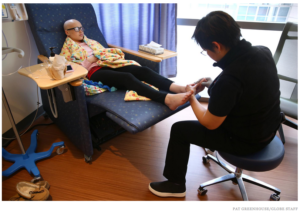Yesterday, an article was published in the Boston Globe called, “Easing a Patient’s Pain – Even Without Proof it Works.” The article discusses the use of acupuncture, massage, reflexology, and Reiki at Dana-Farber Cancer Institute. It reports that, “The hospital soon will start a nearly $2 million project to convert the first floor of one of its buildings into a new

center for ‘integrative therapies,’’ which eventually could double the number of patients it can accommodate. More than 3,000 patients scheduled appointments for acupuncture and massage last year, a 25 percent jump over 2014.”
This is indeed excellent news for patients at Dana-Farber and for the promotion and acceptance of these complementary therapies. The article says it’s an “unusual” move but actually this is not so unusual as in 2008 over 800 U.S. hospitals, or around 37%, offered Reiki according to the American Hospital Association and that number continues to grow.
The article also points out that Reiki was rejected by MD Anderson because there is no definitive proof – it’s just a placebo that’s as effective as speaking to an “empathic person” according to Lorenzo Cohen, director of integrative medicine at MD Anderson. I find this a fascinating statement because in the U.S. we spend large amounts of money on talking to empathic people called psychologists and social workers. If Reiki is as effective as psychotherapy, doesn’t that elevate its status?
Also, the “just a placebo” line has been used so many times. We all know that placebos can be very effective. Yes, we don’t know the biomechanical mechanism involved in Reiki but that’s because we don’t really know how energy interacts in our biomechanical selves and we don’t really know how the mind/body/spirit interact. However, we do know that people who experience Reiki leave a session more relaxed, with less pain, and that they often experience accelerated healing.
As Lissa Rankin, M.D., writes in Mind over Medicine, “What I found is that nearly every clinical trial demonstrates a placebo effect, but some health conditions appear to be more placebo-responsive than others. Placebos seem to be most effective when given to patients with immune-systems conditions . . . mental-health condition . . . nervous-system disorders . . . cardiac symptoms . . . , and most effectively, pain disorders.” She goes on to point out that the placebo effect is not found in clinical trials for cancer, heart attacks, stroke, liver failure, and kidney disease because that would be unethical as a sole treatment.
Dr. Rankin goes on to discuss complementary healing methods and writes, “I’d like to make the argument that perhaps nontraditional healing modalities work not so much because of the modality being practiced as because of the potent combination of positive belief in the healing method, the nurturing care offered by the practitioner, and the relaxation responses these treatments induce.” (page 54)
Indeed, positive belief can be a very powerful prescription and I applaud the important step that the Dana-Farber Cancer Institute is taking to assist their patients in mind, body, and spirit.
I look forward to the day when we fully embrace the role of the mind and the spirit in healing our bodies.

 Let’s get straight to the punch line for this post: With Reiki, as with life, there are no guarantees. I wish there were, but there are not.
Let’s get straight to the punch line for this post: With Reiki, as with life, there are no guarantees. I wish there were, but there are not.